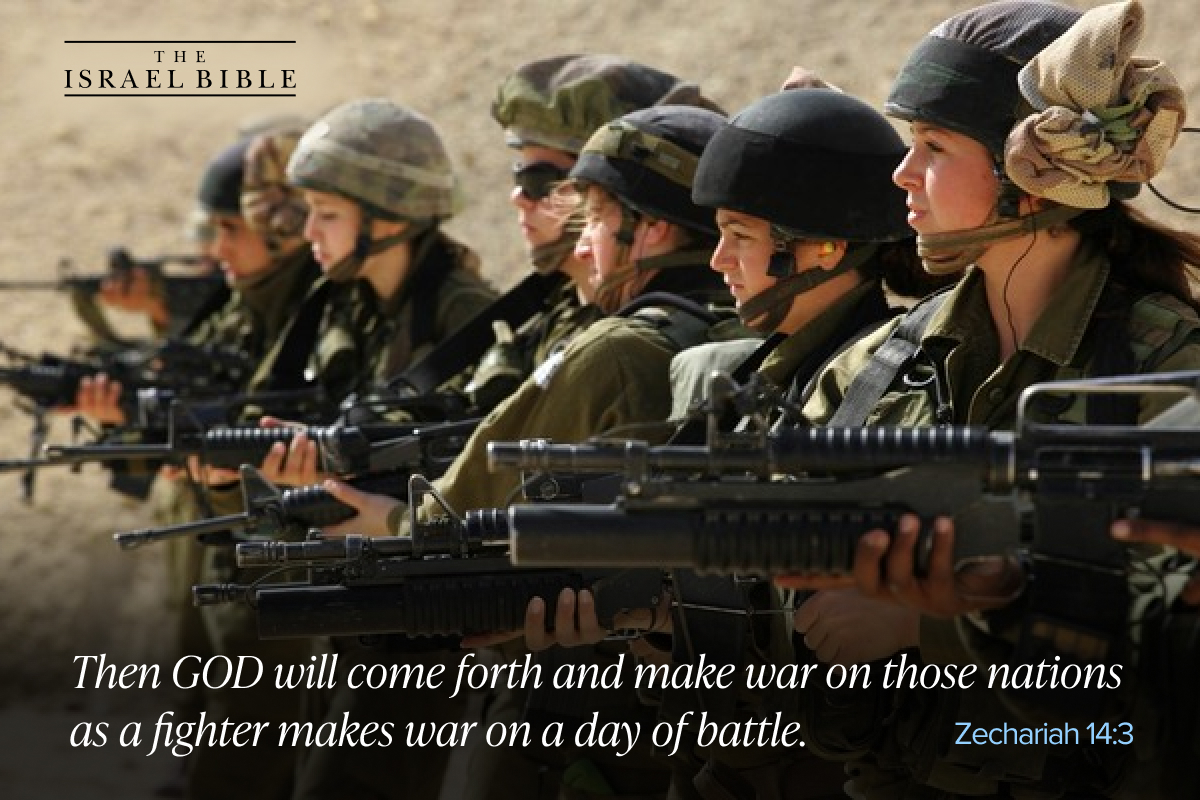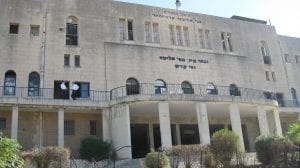
TORAH
NEVI'IM
KETUVIM
Obadiah - Chapter 1
Translation and Transliteration of
Listen to this chapter in Hebrew:
- Commentary
- Buy E-book
- Buy the Israel Bible
1The prophecy of Ovadya. We have received tidings from Hashem, And an envoy has been sent out among the nations: “Up! Let us rise up against her for battle.” Thus said my God concerning Edom:
אחֲזוֹן עֹבַדְיָה כֹּה־אָמַר אֲדֹנָי יְהוִה לֶאֱדוֹם שְׁמוּעָה שָׁמַעְנוּ מֵאֵת יְהֹוָה וְצִיר בַּגּוֹיִם שֻׁלָּח קוּמוּ וְנָקוּמָה עָלֶיהָ לַמִּלְחָמָה׃
2I will make you least among nations, You shall be most despised.
בהִנֵּה קָטֹן נְתַתִּיךָ בַּגּוֹיִם בָּזוּי אַתָּה מְאֹד׃
3Your arrogant heart has seduced you, You who dwell in clefts of the rock, In your lofty abode. You think in your heart, “Who can pull me down to earth?”
גזְדוֹן לִבְּךָ הִשִּׁיאֶךָ שֹׁכְנִי בְחַגְוֵי־סֶּלַע מְרוֹם שִׁבְתּוֹ אֹמֵר בְּלִבּוֹ מִי יוֹרִדֵנִי אָרֶץ׃
4Should you nest as high as the eagle, Should your eyrie be lodged 'mong the stars, Even from there I will pull you down —declares Hashem.
דאִם־תַּגְבִּיהַּ כַּנֶּשֶׁר וְאִם־בֵּין כּוֹכָבִים שִׂים קִנֶּךָ מִשָּׁם אוֹרִידְךָ נְאֻם־יְהֹוָה׃
5If thieves were to come to you, Marauders by night, They would steal no more than they needed. If vintagers came to you, They would surely leave some gleanings. How utterly you are destroyed!
האִם־גַּנָּבִים בָּאוּ־לְךָ אִם־שׁוֹדְדֵי לַיְלָה אֵיךְ נִדְמֵיתָה הֲלוֹא יִגְנְבוּ דַּיָּם אִם־בֹּצְרִים בָּאוּ לָךְ הֲלוֹא יַשְׁאִירוּ עֹלֵלוֹת׃
6How thoroughly rifled is Esau, How ransacked his hoards!
ואֵיךְ נֶחְפְּשׂוּ עֵשָׂו נִבְעוּ מַצְפֻּנָיו׃
7All your allies turned you back At the frontier; Your own confederates Have duped and overcome you; [Those who ate] your bread Have planted snares under you. He is bereft of understanding.
זעַד־הַגְּבוּל שִׁלְּחוּךָ כֹּל אַנְשֵׁי בְרִיתֶךָ הִשִּׁיאוּךָ יָכְלוּ לְךָ אַנְשֵׁי שְׁלֹמֶךָ לַחְמְךָ יָשִׂימוּ מָזוֹר תַּחְתֶּיךָ אֵין תְּבוּנָה בּוֹ׃
8In that day —declares Hashem— I will make the wise vanish from Edom, Understanding from Esau's mount.
חהֲלוֹא בַּיּוֹם הַהוּא נְאֻם־יְהֹוָה וְהַאֲבַדְתִּי חֲכָמִים מֵאֱדוֹם וּתְבוּנָה מֵהַר עֵשָׂו׃
9Your warriors shall lose heart, O Teman, And not a man on Esau's mount Shall survive the slaughter.
v'-kha-TU gi-bo-RE-kha tay-MAN l'-MA-an yi-KA-ret eesh may-HAR ay-SAV mi-KA-tel
טוְחַתּוּ גִבּוֹרֶיךָ תֵּימָן לְמַעַן יִכָּרֶת־אִישׁ מֵהַר עֵשָׂו מִקָּטֶל׃
1:9 Cut off from the Mountain of Esau
In the conclusion of Ovadya’s description of Edom’s downfall, two mountains face off against each other: Mount Tzion, the symbol of justice and peace, and the Mountain of Esau or Mount Seir, which is the symbol of Esau’s treachery and greed. When Tzion defeats Seir, God’s rule over the world will be complete. The end of this prophecy is reminiscent of other verses in the Bible that foretell Hashem’s dominion over the world in future times, with Tzion the seat of His reign. For example, King David writes: “Hashem shall reign forever, your God, O Tzion, for all generations” (Psalms 146:10). Zecharya prophesies: “Hashem shall be King over all the earth” (Zecharya 14:9), and Yeshayahu and Micha envision a time when “Many peoples shall go and say: ‘Come, Let us go up to the Mount of Hashem, to the House of the God of Yaakov, that He may instruct us in His ways, and that we may walk in His paths; for instruction shall come forth from Tzion, the word of Hashem from Yerushalayim” (Isaiah 2:3, Micah 4:2).
10For the outrage to your brother Yaakov, Disgrace shall engulf you, And you shall perish forever
ימֵחֲמַס אָחִיךָ יַעֲקֹב תְּכַסְּךָ בוּשָׁה וְנִכְרַתָּ לְעוֹלָם׃
11On that day when you stood aloof, When aliens carried off his goods, When foreigners entered his gates And cast lots for Yerushalayim, You were as one of them.
יאבְּיוֹם עֲמָדְךָ מִנֶּגֶד בְּיוֹם שְׁבוֹת זָרִים חֵילוֹ וְנָכְרִים בָּאוּ שערו [שְׁעָרָיו] וְעַל־יְרוּשָׁלַ ִם יַדּוּ גוֹרָל גַּם־אַתָּה כְּאַחַד מֵהֶם׃
12How could you gaze with glee On your brother that day, On his day of calamity! How could you gloat Over the people of Yehuda On that day of ruin! How could you loudly jeer On a day of anguish!
יבוְאַל־תֵּרֶא בְיוֹם־אָחִיךָ בְּיוֹם נָכְרוֹ וְאַל־תִּשְׂמַח לִבְנֵי־יְהוּדָה בְּיוֹם אָבְדָם וְאַל־תַּגְדֵּל פִּיךָ בְּיוֹם צָרָה׃
13How could you enter the gate of My people On its day of disaster, Gaze in glee with the others On its misfortune On its day of disaster, And lay hands on its wealth On its day of disaster!
יגאַל־תָּבוֹא בְשַׁעַר־עַמִּי בְּיוֹם אֵידָם אַל־תֵּרֶא גַם־אַתָּה בְּרָעָתוֹ בְּיוֹם אֵידוֹ וְאַל־תִּשְׁלַחְנָה בְחֵילוֹ בְּיוֹם אֵידוֹ׃
14How could you stand at the passes To cut down its fugitives! How could you betray those who fled On that day of anguish!
ידוְאַל־תַּעֲמֹד עַל־הַפֶּרֶק לְהַכְרִית אֶת־פְּלִיטָיו וְאַל־תַּסְגֵּר שְׂרִידָיו בְּיוֹם צָרָה׃
15As you did, so shall it be done to you; Your conduct shall be requited. Yea, against all nations The day of Hashem is at hand.
טוכִּי־קָרוֹב יוֹם־יְהֹוָה עַל־כָּל־הַגּוֹיִם כַּאֲשֶׁר עָשִׂיתָ יֵעָשֶׂה לָּךְ גְּמֻלְךָ יָשׁוּב בְּרֹאשֶׁךָ׃
16That same cup that you drank on My Holy Mount Shall all nations drink evermore, Drink till their speech grows thick, And they become as though they had never been.
טזכִּי כַּאֲשֶׁר שְׁתִיתֶם עַל־הַר קָדְשִׁי יִשְׁתּוּ כָל־הַגּוֹיִם תָּמִיד וְשָׁתוּ וְלָעוּ וְהָיוּ כְּלוֹא הָיוּ׃
17But on Tzion's mount a remnant shall survive, And it shall be holy. The House of Yaakov shall dispossess Those who dispossessed them.
uv-HAR tzi-YON tih-YEH f'-lay-TAH v'-HA-yah KO-desh v'-ya-r'-SHU BAYT ya-a-KOV AYT mo-ra-shay-HEM
יזוּבְהַר צִיּוֹן תִּהְיֶה פְלֵיטָה וְהָיָה קֹדֶשׁ וְיָרְשׁוּ בֵּית יַעֲקֹב אֵת מוֹרָשֵׁיהֶם׃
![]() 1:17 But on Tzion’s mount a remnant shall survive.
1:17 But on Tzion’s mount a remnant shall survive.

Front wall of the Ponovezh Yeshiva in Bnei Brak
Ovadya uses the same Hebrew word, playta (פליטה), ‘remnant,’ that Yaakov originally used to describe his confrontation with his brother: “If Esau comes to the one camp and attacks it, the other camp may yet escape (playta)” (Genesis 32:9). When the same Hebrew word is used to describe unrelated events, this means that the Tanakh is alluding to a deep connection between them. Ovadya is invoking the great confrontation between Yaakov and Esau to describe the final encounter between the Jews and their enemies, and teaching us the ultimate secret to the survival of Yaakov’s descendants, the Jewish people. When the European Jewish community realized the grave danger Hitler posed, they found solace in the words of the Tanakh and recognized that “on Tzion’s mount a remnant shall survive.” The saintly Rabbi Israel Meir Kagen (1839-1933), known as the Chofetz Chaim, told his students that the survival of the Jewish people would be through the Land of Israel. In fact, the great Ponevezh Yeshiva in Bnei Brak, one of the largest centers of Torah study in the world, has this verse etched on its front wall, reminding its students never to forget that Tzion is the only refuge from persecution and the wrath of Esau.
18The House of Yaakov shall be fire, And the House of Yosef flame, And the House of Esau shall be straw; They shall burn it and devour it, And no survivor shall be left of the House of Esau —for Hashem has spoken.
יחוְהָיָה בֵית־יַעֲקֹב אֵשׁ וּבֵית יוֹסֵף לֶהָבָה וּבֵית עֵשָׂו לְקַשׁ וְדָלְקוּ בָהֶם וַאֲכָלוּם וְלֹא־יִהְיֶה שָׂרִיד לְבֵית עֵשָׂו כִּי יְהֹוָה דִּבֵּר׃
19Thus they shall possess the Negev and Mount Esau as well, the Shephelah and Philistia. They shall possess the Ephraimite country and the district of Shomron, and Binyamin along with Gilad.
יטוְיָרְשׁוּ הַנֶּגֶב אֶת־הַר עֵשָׂו וְהַשְּׁפֵלָה אֶת־פְּלִשְׁתִּים וְיָרְשׁוּ אֶת־שְׂדֵה אֶפְרַיִם וְאֵת שְׂדֵה שֹׁמְרוֹן וּבִנְיָמִן אֶת־הַגִּלְעָד׃
20And that exiled force of Israelites [shall possess] what belongs to the Phoenicians as far as Zarephath, while the Jerusalemite exile community of Sepharad shall possess the towns of the Negev.
כוְגָלֻת הַחֵל־הַזֶּה לִבְנֵי יִשְׂרָאֵל אֲשֶׁר־כְּנַעֲנִים עַד־צָרְפַת וְגָלֻת יְרוּשָׁלַ ִם אֲשֶׁר בִּסְפָרַד יִרְשׁוּ אֵת עָרֵי הַנֶּגֶב׃
21For liberators shall march up on Mount Tzion to wreak judgment on Mount Esau; and dominion shall be Hashem's.
v'-a-LU mo-shi-EEM b'-HAR tzi-YON lish-POT et HAR ay-SAV v'-ha-y'-TAH la-do-NAI ha-m'-lu-KHAH
כאוְעָלוּ מוֹשִׁעִים בְּהַר צִיּוֹן לִשְׁפֹּט אֶת־הַר עֵשָׂו וְהָיְתָה לַיהֹוָה הַמְּלוּכָה׃
![]() 1:21 For liberators shall march up on Mount Tzion
1:21 For liberators shall march up on Mount Tzion

Rabbi David Stavsky (1930-2004)
Who are the liberators who will march upon Mount Zion and judge the enemies of the Jewish people? Rabbi David Stavsky (1929-2004) quotes several commentators including Radak, Malbim and Mezudat David, who agree that these saviors are the Mashiach and his ministers. He writes that especially in our own times, following the Holocaust and the establishment of the State of Israel, “We must analyze and understand every nuance of this verse, for I believe we are living in a time when Ovadya’s prophecy is at last being realized… These seem to be the days of a Messianic era. If not, how else can we explain the awakening from a coma of millions of Soviet Jews, a resuscitation, a life after spiritual death, a return to a Judaism that they knew of, but could not practice. We feel in the depths of our souls, in the marrow of our bones, that we are living in Messianic times.”






